
“I believe music is universal, and it responds to the context in which it was created,” says Mare Advertencia Lirika–or Mare, as she's known professionally. “In my case, coming from indigenous roots, my music is the voice that speaks to this context.”
In Oaxaca, Mexico, where Mare makes her home, responding to her surroundings takes on an urgent meaning, as, in the past decade, the southern Mexican state has become an epicenter for indigenous and popular struggle against economic injustice–and hip-hop has evolved to become a soundtrack to that struggle.
]
Her song “¿Cuántos Más?” (“How Many More?”) is a prime example, decrying the impunity with which 26 people, including those associated with Popular Assembly of the Peoples of Oaxaca (APPO), were killed by paramilitary and police forces during a 2006 uprising that captured international attention. That year, a teachers' strike crystallized into all-out tumult demanding direct democracy and the ouster of Ulises Ruiz Ortiz, the violently repressive then-governor of the Institutional Revolutionary Party (PRI).
Well before the dramatic rebellion, Mare's journey through music began as a young girl. “I sang in the choir at school,” she says, reminiscing about singing traditional music at a recital. “Although I like all music in general, I became interested in hip-hop about 14 years ago–first with graffiti, and later with the rap that was being produced in Mexico that interested me much more.” She formally began her foray into the genre in 2003 as a member of a rap group, but she has since gone solo. Over the years, she has shared the stage with acts such as Cuba's Krudas Cubensi, Argentina's Alika and East Los Angeles' own Delinquent Habits.
With Zapotec blood coursing through her veins, Mare espouses socially conscious, feminist-inspired lyrics, eschewing individualism in favor of more communal values. Consistent with her ethos, she is also a part of Mexico's Mujeres Trabajando (Women At Work) hip-hop collective. The group emerged in 2009 and includes Mexican rappers such as Jezzy P and Ximbo, in addition to artists in the fields of graffiti, beat making and breaking. As with anything Mare involves herself with, the collective aims to develop women's talents, the goal being full and equal participation in the artistic and working sectors of Mexican society.
[
Harnessing their talents, Mujeres Trabajando issued a compilation album. With its critical lyrics of female empowerment, Mare's “¡Que Mujer!” (“What a Woman!”) is a fitting addition–as well as the title of her 2010 EP. “This is the first solo material that I've put out,” she says of the seven-song effort. “The theme is everyday life. These are stories I have seen, experienced and lived, some more personal, but also stories that can be from anyone else.”
On her current tour in the United States, she is accompanied by Simón Sedillo, a filmmaker and activist who is promoting a new documentary about the rapper. Cuando Una Mujer Avanza (When a Woman Steps Forward) features stylish music videos coupled with a portrait of Mare's unique life. “In this documentary, we tried to tell a story that shows the reality of many women in Oaxaca, things that we deal with on a day-to-day basis such as the church, sexism, social movements and much more,” she says.
On Mare's travels through the States, she has also gained some perspective. “I have seen various sides to hip-hop here,” she says. “I have learned so much, not only about hip-hop, but also about the very different social context that is lived here.”
Mare performs at Santa Ana's El Centro Cultural de Mexico Saturday.

Gabriel San Román is from Anacrime. He’s a journalist, subversive historian and the tallest Mexican in OC. He also once stood falsely accused of writing articles on Turkish politics in exchange for free food from DönerG’s!

